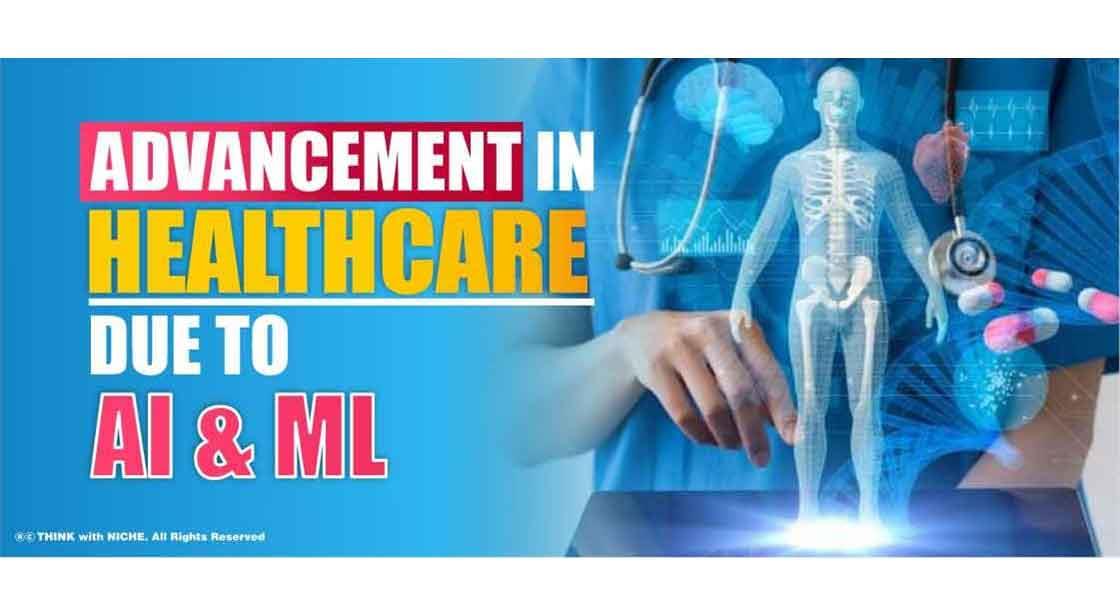Advancement in Healthcare due to AI and ML

Blog Post
According to Accenture, the AI MedTech market will be worth $6.6 billion by the end of 2021. Artificial intelligence is being used in healthcare by medical professionals and facilities to create new insights, provide improved patient care, and accelerate therapies for incurable diseases. The human element will always be required in operations to verify that therapy is appropriate and has an emotional effect. The advantages of AI in healthcare are related to the analysis of large volumes of data and the generation of life-saving information as well as significant insights. #ThinkWithNiche
Healthcare facilities that effectively analyze data obtain conclusions that save patients' lives. AI in healthcare firms creates Machine Learning algorithms, Natural Language Processing (NLP)-based solutions, and Deep Learning skills to evaluate enormous volumes of data. AI in healthcare comes in a variety of spheres. AI frequently makes use of a web database, which provides doctors and practitioners with access to hundreds of diagnostic materials. Machine Learning approaches employ analytical algorithms to extract certain patient attributes, which incorporate all of the data gathered during a patient consultation with a professional. Physical exam results, drugs, symptoms, disease-specific data, gene expressions, diagnostic imaging, and other laboratory testing all contribute to the organized data collected. Outcomes can then be predicted using ML algorithms.
Because doctors have been thoroughly educated in their profession and are up to date on current research, the application of AI dramatically raises the likelihood of a quicker result that can be checked with their medical knowledge. Many people are concerned that artificial intelligence will eventually replace or reduce the necessity for human physicians, particularly in the clinical context. Recent studies and statistics, however, indicate that this tool is more likely to assist and enhance clinical diagnosis and decision making than eliminate physician demand.
Applications
Decreasing re-hospitalization is a big concern for health providers. Medicare payments are connected to readmissions, and ignoring this problem can be expensive. Machine learning algorithms have the potential to improve care delivery by giving physicians with daily recommendations on which patients are highly likely to be hospitalized and how they can minimize that possibility.
Chronic illnesses (cancer, mental health disorders, heart and lung disease, and others) kill 7 in every ten people in the United States annually. Predictive analytics has been recognized as a central driver of quality and cost improvement in healthcare. However, hospital systems encounter technical, regulatory, and data aggregation challenges when implementing predictive analytics. Digitally stored diagnostic imaging data is abundant these days, and DL algorithms can be loaded with this type of information to detect and find trends and abnormalities. Machines and algorithms can analyze imaging data in the same way as a highly-skilled radiologist can, recognizing abnormal skin patches, lesions, tumors, and brain bleeding. As a result, the use of AI/ML tools/platforms to aid radiologists is expected to grow tremendously.
Conclusion
There is a lot to be gained by using AI/ML in healthcare. A wide range of interesting and forward-thinking uses of AI/ML technologies and platforms in health were highlighted. AI/ML benefits are quite simple to realize for healthcare firms. However, the majority of people fail to do so. Why? For one reason, it is owing to multiple infrastructure and tool provisioning problems.
You May Like
EDITOR’S CHOICE












